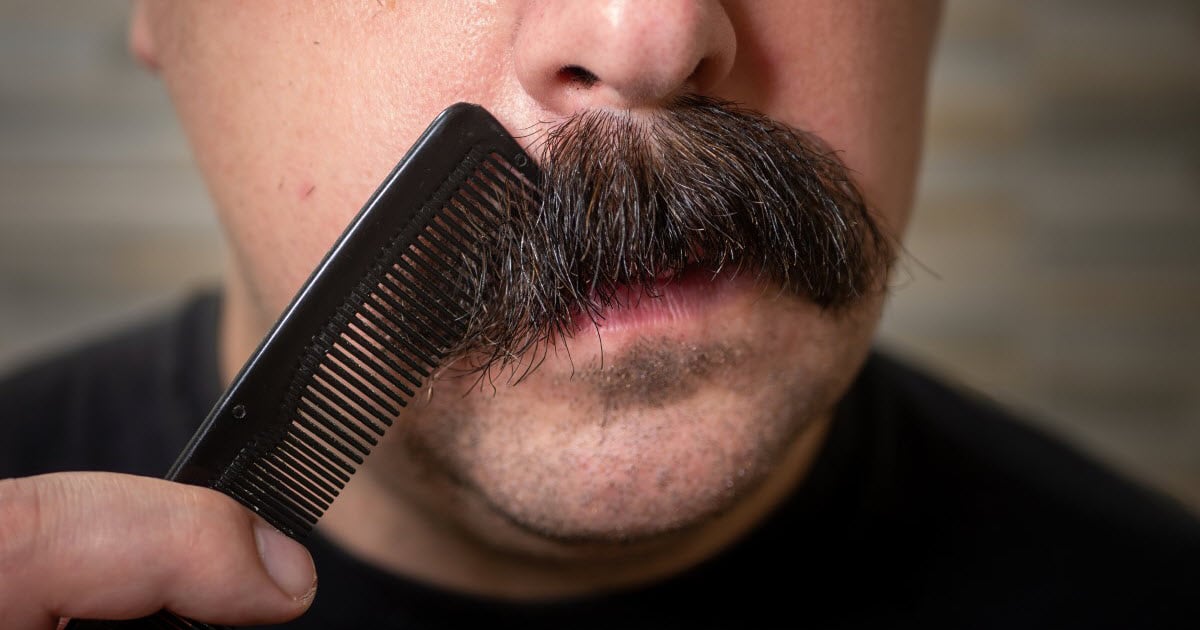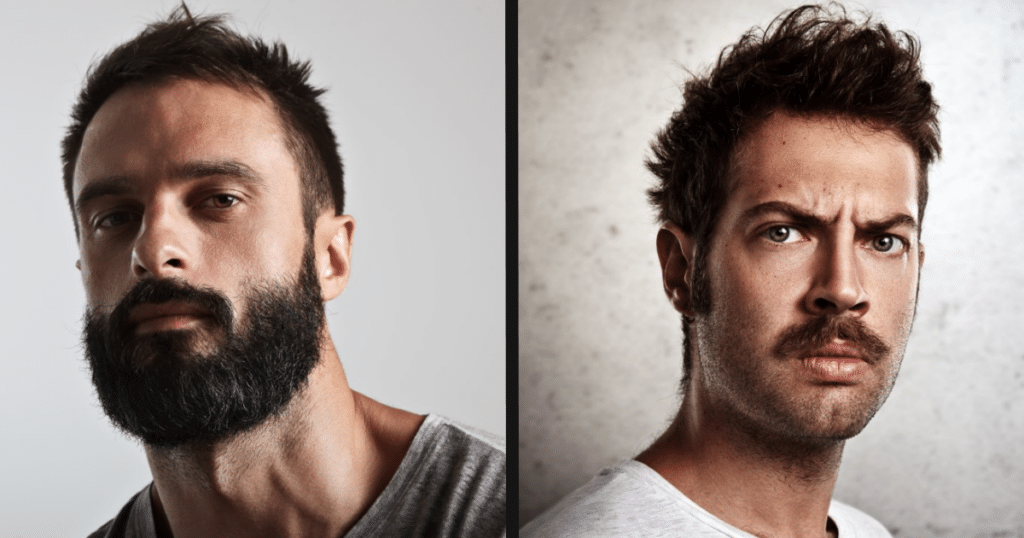The mustache never seems to go out of style. From Tom Selleck and Sam Elliot to Henry Cavil and Idris Elba, classic and modern men agree that a good mustache adds character, style, and power to your look. Now, it’s just a matter of how to grow a thicker mustache if it doesn’t come naturally. That’s what we’ll talk about today, so if you’re struggling with a thin or wispy ‘stache, keep reading.
Maybe your buddies grow long, thick facial hair with no problem but it’s something you’re having issues achieving.
You’re not alone. Lots of men struggle to grow thick, full facial hair. But not to worry because there are ways around it. After all, not every thick mustache you see is the result of good genes.

Having trouble growing thick upper lip hair? Today we’ll explore 11 ways to make your mustache thicker and fuller.
But first, here are possible reasons why your mustache isn’t growing.
Possible Reasons Your Mustache Isn’t Growing
There are several potential reasons your mustache isn’t growing as thickly or quickly as you’d like.
Here are the factors that influence how your mustache grows:
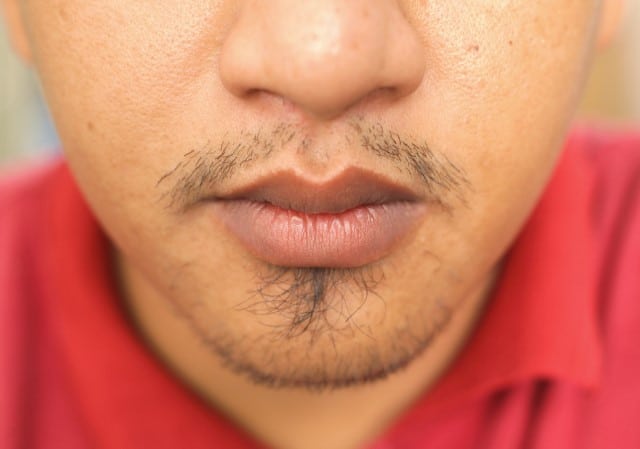
Hormones
Testosterone is the key hormone in facial hair growth. If your hormone levels are lower than average, it may affect your mustache’s growth and thickness.
Genetics
Genetics affect your ability to grow facial hair according to Healthline. If other family members have thin facial hair, chances are high that genetics are limiting your potential for a thick mustache.
Health and Nutrition
Lacking essential nutrients such as zinc, iron, and B vitamins may hinder facial hair growth.
Stress and Habits
Chronic stress can disrupt hormonal balance, leading to slower facial hair growth. Similarly, lack of sleep, smoking, and excessive alcohol consumption can also cause slower hair growth.
Poor Grooming
Over-grooming and poor grooming practices can damage hair follicles and thus hinder growth.
Medical Conditions
Some medical conditions, such as hormonal imbalance and autoimmune diseases, can challenge proper facial hair growth. Similarly, chemotherapy drugs can inhibit facial hair growth as a side effect.
Product Use
Using harsh or low-quality facial hair products could damage the hair follicles and may cause slow growth.
Now you know the factors that can interfere with your mustache growth, let’s find out how your hair grows.
Understanding Mustache Growth
Hair growth goes through three distinct phases:
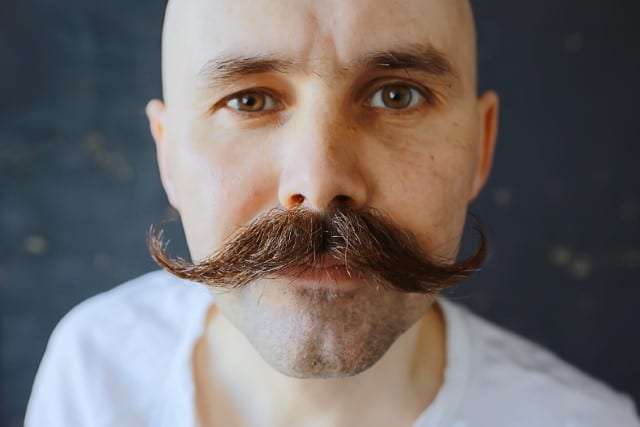
Phase One: Anagen
The first stage, also known as the anagen phase, is the growth phase. During this time, the root grounds and strengthens itself.
Hair will grow from the root, dividing at a rapid rate. For mustache hair it lasts up to seven years, sometimes more. It is much longer for scalp hair, which explains why mustaches don’t grow to the floor!
During the first phase, the mustache can grow up to half an inch or more monthly. It is also worth noting that each follicle has its own genetic cycle, so mustache hairs may not grow at the same rate and length.
Phase Two: Catagen
The catagen process has no growth. It is the shortest of all the phases, representing the transitional part of the cycle. The hair strands separate from the hair follicles and attach to the skin. It cuts off the blood supply to the hair.
Therefore, hair growth is no longer in the active stage. We sometimes hear people refer to it as ‘club hair.’ The phase can go on for two to three weeks.
Phase Three: Telogen
The telogen phase is when the follicle completely resets. Still, very little is happening, starting with a rest period.
New hair pushes the old hair out, causing it to fall off. It is why everybody continuously sheds hair, even from the mustache.
This process may last two to four months, after which the hair reverts to the anagen phase, starting the cycle again.
How To Grow A Thicker Mustache: 11 Ways That Work!
There are plenty of things you can do to help yourself grow a thicker mustache. That’s exactly what we’ll discuss below.
1. Proper Nutrition
Good nutrition from a balanced diet can help improve your mustache’s thickness. A good diet prevents low testosterone, which inhibits facial hair growth.
Therefore, you must keep your weight in check to prevent low testosterone.

In addition, you can incorporate various foods to help improve testosterone levels. Add the following foods to your diet:
Lean Proteins
Proteins such as chicken and salmon help increase testosterone levels significantly.
Liver
Liver is rich in iron, which can help boost testosterone.
Healthy Fats
Consuming healthy fats helps support testosterone levels and helps with hormone balance. Add more avocados, nuts, and fish to your diet. In addition, use olive or sunflower oil to cook.
Fruits and Vegetables
Fruits and veggies high in vitamin B can help boost those levels. Therefore, eat more leafy greens like spinach, bananas, tomatoes, watermelons, and peas.
Complex Carbohydrates
Eat more beans, whole grains, sweet potato, lentils, oats, and brown rice.
Remember, while a good diet won’t override genetics, it does help your facial hair get as full and thick as it possibly can.
2. Supplements
Even with a proper diet, you may need a little extra help in the form of supplements. Sure, they’re not magic pills that transform you into a Selleck type, but they can make your journey to a thicker mustache quicker and more efficient.

Here are some supplements that could aid in mustache growth:
Zinc
Zinc plays a key role in hair tissue growth and repair. It nourishes the oil glands around the follicles, stimulating hair growth.
You should consider zinc supplements, but don’t overdo it! Like with most other supplements, too much could have a negative health effect.
Vitamin D
Vitamin D significantly helps your hair follicle health by balancing the hormones and triggering testosterone production. It also helps to create new hair follicles and maintain hair thickness.
Biotin
Biotin, or vitamin B7, helps metabolize protein, carbs, and fats. In addition, biotin helps in the production of keratin, a major hair protein.
Therefore, you could try biotin supplements to stimulate hair growth.
Vitamin E
Vitamin E is great for facial hair growth because it helps skin cells regenerate faster, thus promoting proper hair growth. In addition, the vitamin helps repair damaged hair follicle cells.
Vitamin E has anti-inflammatory properties that improve skin health for proper hair growth.
Omega-3 Fatty Acids
Omega 3 fatty acids improve hair growth by reducing inflammation and supporting hair follicle function.
Collagen
Collagen supplements can provide essential amino acids and proteins for hair structure, leading to a thicker mustache.
Vitamin A
The vitamin helps produce sebum, which is essential for keeping facial hair hydrated and healthy. Vitamin A supplements can help, but be cautious, as excessive intake is unsuitable for your health.
Iron and Vitamin C
Iron alone cannot stimulate healthy hair growth. You need to pair it with sufficient Vitamin C to encourage iron absorption. Iron contributes to red blood cell production, ensuring a sufficient oxygen supply to hair follicles.
3. Hair And Skin Care
Proper hair and skin care are essential for mustache growth. You need to take care of the skin underneath the mustache as you care for it.
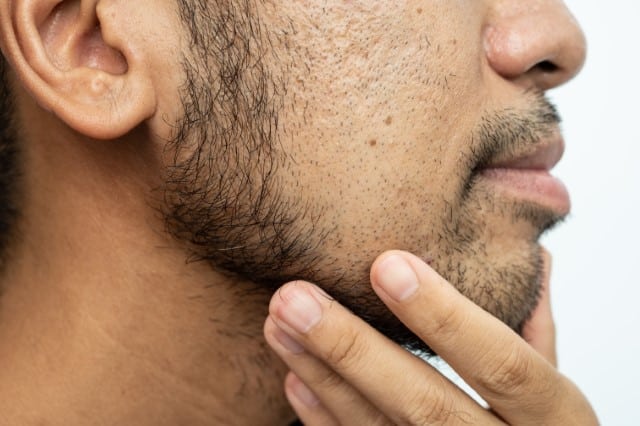
There are several things you can do, including trimming and exfoliating. Try the following routine:
Exfoliating
Exfoliation removes dead skin cells and debris around each hair follicle. It allows hair to grow through the skin with no obstacles.
Exfoliating is also great for reducing ingrown hairs under the mustache.
Moisturize
It is important to keep the skin under your mustache hydrated. Moisturizing the skin helps to heal it, remove dry and rough spots, and soften it.
Moisturizing also prevents flaking and inflammation, thus preventing stagnated growth. Massaging a moisturizer into the skin promotes blood circulation in the area.
Better blood flow means oxygen and essential nutrients reach hair follicles, thus enhancing growth.
Trimming
Cutting is the last thing you want to do, right? A little trim could contribute to a thicker mustache.
Trimming removes split ends that make your mustache appear thin and unhealthy. In addition, it helps to control uneven growth, giving the slow hairs time to catch up.
Finally, trimming also helps remove dirt and debris that may hinder healthy hair growth.
4. Exercising
Exercise can indirectly support mustache growth in various ways. For starters, moving more helps to increase blood flow to your body, including the facial area.

Enhanced circulation delivers more oxygen and nutrients to the hair follicles in the mustache region, potentially stimulating hair growth. Other ways exercise helps include:
Improved Sleep
Engaging in physical movement leads to better sleep quality. You sleep better and longer, which is great for overall health and body processes such as hair growth.
Deep sleep allows the repair and regeneration of hair follicles.
Hormonal Balance
Regular exercise helps to regulate hormones, which is beneficial for your testosterone levels. Maintaining healthy testosterone levels helps to support the growth of a thicker mustache.
Reducing Inflammation
Chronic inflammation can interfere with the natural cycle of hair follicles. Exercise has an anti-inflammatory effect that can promote a healthy environment for facial hair growth.
Of course, like other methods, exercise does not lead to dramatic or immediate changes. It creates a favorable environment for mustache growth.
5. Stress Management
Being stressed affects your appearance. And while some people never notice, stress could affect their facial hair in several ways.
For starters, stress increases cortisol production, which affects your hormone levels, thus affecting mustache growth.

Stress may also trigger alopecia areata, which causes patches of baldness around the body, including your mustache. The immune system attacks follicles, triggering baldness in the areas.
On top of that, stress can trigger a tick where you pick at your hair or face. If it happens to be on your mustache or scalp, your hair will fall out due to this habit.
Therefore, you should manage your stress levels to prevent developing these conditions and reduce cortisol production to keep hormone levels optimum.
Exercise, meditation, music, dance, gardening, and participating in similar activities can help you reduce stress, improving your chances of growing a thicker mustache.
6. Adequate Sleep
Studies show that sleep desperation can reduce facial hair growth significantly. First, lack of sleep reduces testosterone production, leading to low hormone levels, which impact mustache growth.

Similarly, lack of sleep can increase stress, which causes the body to produce more cortisol. The high cortisol levels affect testosterone levels, limiting healthy facial hair growth.
You can prevent this by sticking to a good bedtime routine and finding ways to improve sleep quality. Start by developing a standard time for sleeping and waking up.
Remove TVs, smart devices, and other distractions from your bedroom to prevent sleep disruption. If your final thoughts before bed affect your sleep quality, keep a journal or write a to-do list to remove any worries about the coming day.
Finally, reading a physical book rather than reading on your tablet or phone is best to help you fall asleep quicker.
7. Patience
Sometimes, it’s good just to leave your mustache alone. Facial hair can, unfortunately, take months to come in, depending on how your genetics affect the hair growth cycle.
Therefore, if you’ve been waiting a month, get prepared to wait significantly longer.
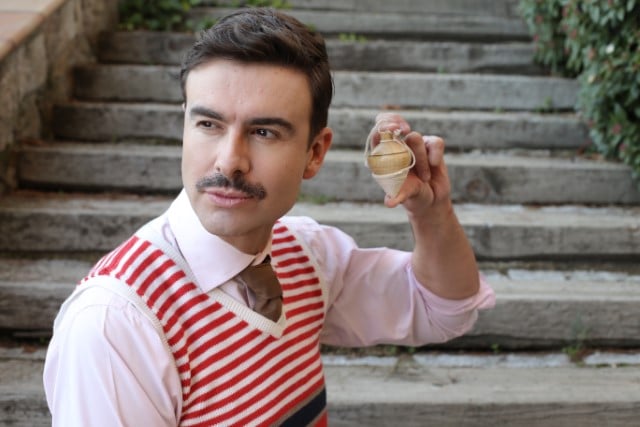
You may receive advice to shave your mustache to help it grow. However, you just need to be patient since shaving does not always have this effect.
Mark your calendar a few months ahead and take pictures of your mustache growth over time. It may start awkward but could end in glorious upper lip hair.
8. Facial Hair Products
The right hair products can lead to exceptional mustache growth. You can use various products to encourage mustache growth, from DIY balms to professionally manufactured oils.
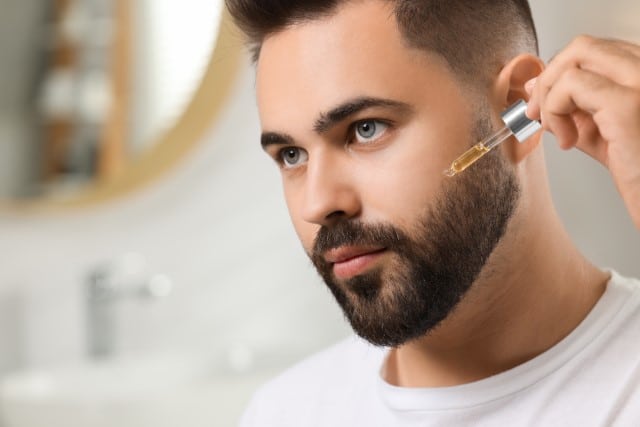
Here are some products that you can try.
Beard Oil
Beard oils help support mustache growth. They contain carrier oils such as argan, jojoba, and coconut oil, which nourish follicles and improve the environment for hair growth.
There are also many outstanding beard oils available on the market.
To help get your mustache growing, check out Beardoholic Beard Oil (Unscented).
This
If you go for an aromatic oil, make sure that you like the scent.
Balms
Balms combine moisturizing agents such as shea butter and beeswax, which moisturize hair follicles. It reduces the chances of breakage and creates a suitable environment for hair growth.
Serums
Serums have ingredients such as peptides and biotin, which help hair growth by stimulating hair follicles and improving blood circulation.
Wax
Mustache wax does not directly affect growth. However, it can help the mustache appear thicker since it coats individual hairs with the product and brings them closer together.
The moisturized environment can also prevent breakage.
9. Avoiding Bad Habits
Some lifestyle habits can hinder your mustache growth journey. Here are some of them below.
Excessive Alcohol Consumption
Heavy alcohol consumption leads to nutrition deficiency and dehydration, which affects hair growth. If you’re on a mustache journey, moderate alcohol consumption and monitor the differences.
Smoking
Smoking restricts blood flow, meaning hair follicles do not receive essential nutrients for a stimulating environment. Limit tobacco use to increase the chances of hair growth.
Dehydration
Drinking enough water reduces the chances of dry skin and hair follicles, improving the environment for hair growth.
10. Topical Treatments
Consider other treatments if you’ve been patient and keeping up with a healthy lifestyle while using good hair products.
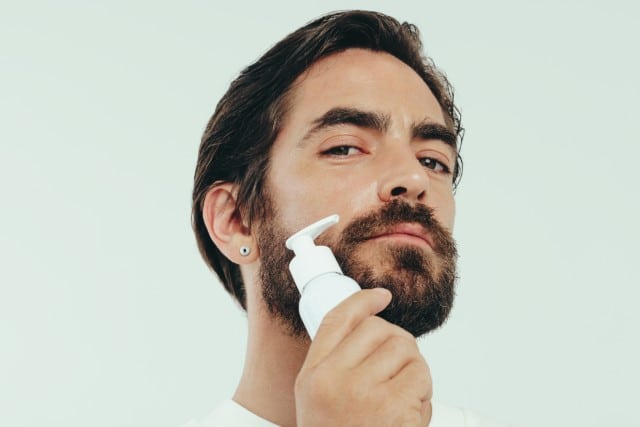
Some treatments help to increase facial hair growth significantly. If you choose this path, here are a few things you should look into:
Minoxidil
While it is generally for people with high blood pressure, minoxidil is often cited only as being great for improving facial hair growth, and some studies back that up.
The exact mechanism of minoxidil still requires further research, but experts confirm that it widens blood vessels, stimulating better blood flow to the area and thus stimulating hair growth.
Derma Rollers
If your mustache is not as thick as you want, consider using a derma roller to improve growth. Derma rollers have microneedles that pierce the outer skin layer, inducing collagen production.
Collagen has a lot of amino acids that help hair follicles produce keratin proteins and increase hair growth and strength.
11. If All Else Fails, Go to the Experts
Lastly, if nothing works, consider seeking expert help. Experienced dermatologists and hair experts may better understand what you can do to stimulate the growth of a thicker mustache.
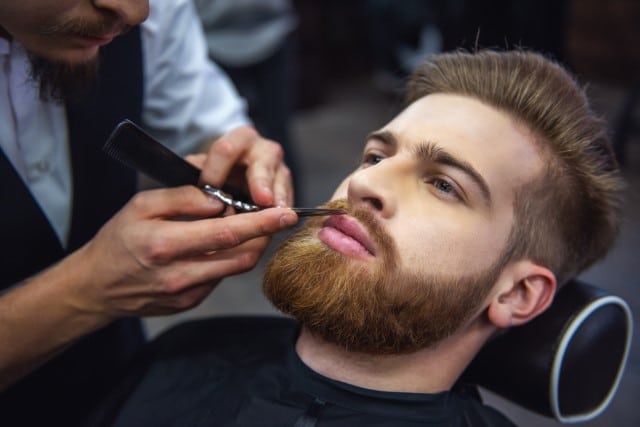
One of the options a professional may give you is transplants. You could get a mustache treatment called Follicular Unit Extraction or FUE.
It is a surgical procedure that transplants follicles to your face, which take root and lead to growth.
Tip: As you attempt any of these methods, remember that patience is a key part of the journey.
If you monitor growth daily, it will feel like nothing is changing. So, consider tracking your progress weekly to avoid getting discouraged.
Final Thoughts: How to Grow a Thicker Mustache
Struggling to grow a killer ‘stache? Don’t worry! Not every impressive mustache you see is solely the result of good genes.
The first step is understanding why your mustache isn’t growing as thickly as you’d like. Proper skincare, nutrition, and lifestyle are at the heart of improving the chances of a thicker mustache.
Combined with other methods, you increase the chances of a thicker mustache. Finally, when nothing else works, consider treatments and supplements to increase the chances of lustrous upper lip hair.
Also, remember that the path to a thick mustache may be a journey, but with patience and persistence, you can finally be part of Movember!
Michael Morris is the head writer here at Rough and Tumble Gentleman. He's got a ducktail beard and loves Brazilian jiu-jitsu. He's married to the woman of his dreams and lives in Brooklyn, NY.

